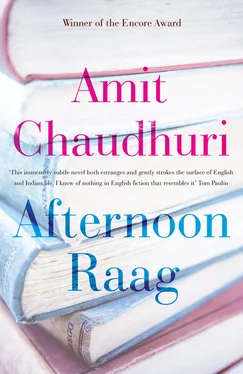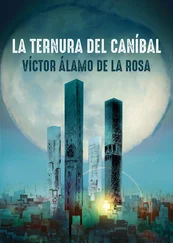Cowley Road was on the other side, East Oxford. Long ago I had accompanied Sharma, in hope of seeing an erotic Japanese film, In the Realm of the Senses , to the Penultimate Picture Palace. After the roundabout, three roads ran parallel to each other — St Clement’s, Cowley Road, and Iffley Road. Full of spirit, we took the Cowley Road to the Picture Palace, but found, alas, that there were no tickets. The road was lined with Bangladeshi shops, and energetic little Muslim boys wearing skull-caps played on the pavement; they did not look foreign, but very provincial and East London. After darkness fell, the shops remained lighted and open, and old Pakistani gentlemen in overcoats, holding crumpled carrier-bags in their hands, had a chance to meet each other inside and converse in idiomatic Punjabi. Politics was discussed; the Bhuttos; Kashmir; cowardly India; bullying India; and the Indian cricket team was dismissed, quite rightly, with a contemptuous but decorous burst of air from the lungs. ‘Asian’ couples with shopping-trolleys went down aisles stacked with boxes of chilli powder, packets of dried fruit, jars of pickles, and imported vegetables — roots and tubers — with the flecked soil of Bangladesh still upon them; the shopkeeper continued his conversation in full-throated asides while his hands worked at the till; and to pay him, finally, in pounds rather than in rupees was like a joke whose meaning we both shared. There was a row of Indian restaurants along the road; at six o’clock, Muslim waiters stood significantly by the windows, and at night, the interiors glowed with a lurid red light. The furniture, selected with some tender and innocent idea of opulence in mind, was cheap and striking; honest Englishmen sat being served among fluted armrests and large, mendacious pictures of palmtrees and winding rivers, helplessly surrendering to an inexhaustible trickle of eastern courtesy; everything, including the waiters, smelled strongly of mint and fenugreek. The restaurants were seedy, but generous with life; and from the silvery letters of the sign outside, to the decor within, was a version of that style called the ‘oriental’.
It was in a small geometrical graduate room, in a modern building full of other such rooms, that I lived in those days. I was on the ground floor, and could hear the doorbell clearly when it rang. It used to make me, and perhaps every other student, specially alert and anticipatory; there would be a brief heightening and then a return to normalcy. In my pocket I carried, whenever I went out, two Yale doorkeys that gave me access to the building and my own door. Each was a twin of the other, unpretentious, golden-coloured, and dignified in the way it did not draw attention to the touch; one used the keys unconsciously and trustingly after the initial uncertain period of not knowing which was for which door was over. To my door was screwed a simple hook, from which my sweater and jacket, and later, in winter, my overcoat and scarf also, hung in a warm and voluminous pile. I did not notice until much later that all the hooks in Oxford, whether in public libraries or in college rooms, were the same as the one on my door, and belonged to a great family. There were two modern, comfortable armchairs opposite my bed, but in one of them the cords supporting the seat were a little loose, so that, when one sat on it, one slipped backward suddenly; then, after having spent one immobile and astonished moment in that position, one smiled and righted oneself. Even the good armchair was tilted at a slight, but more natural, axis, and I sat in it whenever I was tired, or had company. The armchairs, with their flat, sedentary cushions, were designed for society, but the bed was made for solitude. It had a straitened and measured narrowness, an austere frame made to contain the curves of a single body, to circumscribe it, carry it, give it a place, and when I slept at night, I possessed it entirely.
The loneliest of occupations was taking armloads of dirty clothing, stuffing them in a traveller’s shoulder bag, and walking with it to the laundry room across the road. My main ambition was to diminish each moment, to hold as much as possible in as little space, to do things with the least depletion to time and effort. I disliked portioning out the load, for instance; I crammed in more than the bag could contain, and when, finally, I could not zip it, I would push against the clothes with all my weight, repeatedly and brutally, till they had been perfectly packed in.
Or I sat in my room with Lawrence’s Complete Poems on my lap, looking at a page on which the long Laurentian lines spilled and overflowed from one verse to the other. I hated libraries, where human beings hunched strangely over their books, behaving like birds who were not eating, but studying, their prey, in a silence where the only things that whispered were the leaves of the books. Who were these people; what did they do at night; what peculiarly displaced lust drove them to fill in order-forms and push them confidentially towards a woman, and have a conveyor belt with a cargo of books turn endlessly in the basement for their benefit? I stayed safely in my room and tried to make sense of the beauty of ‘Bavarian gentians, big and dark, only dark,/darkening the day-time’, or ‘Have you built your ship of death, O have you?’, or ‘the fragile ship of courage, the ark of faith/with its store of food and little cooking pans’, or, especially, ‘You tell me I am wrong./Who are you, who is anybody to tell me I am wrong?’, while the sound of someone making coffee entered my reading, and a portrait of Lawrence, gaunt, red-bearded, stared at me like a demon and kept me company.
I rented a television set for a few months, and became acquainted with Postman Pat and Blue Peter, and my afternoons were shaped by a soothing jumble of quiz-shows, word-games, and Fifteen to One. Though poor in general knowledge, at guessing synonyms, and at making sense of the teasing, child-like nuisance of letters in an anagram, my mind, for a while, joyously deluded itself that it was in a state of agile and athletic excitement, and loved nothing more than being vanquished, in the end, by a retired widow from Dorset or a stuttering unemployed electrician from Leicester, sweet and harmless-looking people who had nevertheless used their empty hours to squeeze from themselves a razor-sharp competence in these matters.
There were times when I escaped to London, and as people fell asleep on the coach, their heads nodding and chiming in unison, I had occasion to think of my parents speaking to each other in Sylheti, or the sensation of standing on a veranda on a hot day. Scenes flashed past; and they flashed past when I returned in the evening, when I would see miles of suburbia on the edge of the motorway, house after house with a fragile, liminal television aerial on the roof, beneath a sky from which birds and clouds fast disappeared. It seemed that if extraterrestrial intelligence had a message for earth, it would be here, among these nondescript houses, at this moment, as it darkened outside and a family gathered around a television, that they would send it, to be recognized and deciphered by, of course, a boy in shorts with dreams in his head.
Two sisters, Chhaya and Maya, take turns to clean the bathroom in our house in Bombay. I have seen the younger one, Chhaya, a girl with two protruding teeth who leaned wistfully between chores against a door to listen to my mother practise, or ran to snatch the bag of rubbish from Ponchoo, grow to a young woman with kaajal around her eyes, and unexpected breasts, two small, painless swellings. On the festival of Raakhi, she ties a thread around my wrist with a crazy silver flower upon it. Maya, the older one, is silent, ebony-dark, and wears clothes made from a shimmering synthetic material with silvery or purple hues, so that, even while collecting rubbish, she looks minty and refreshing.
Читать дальше












